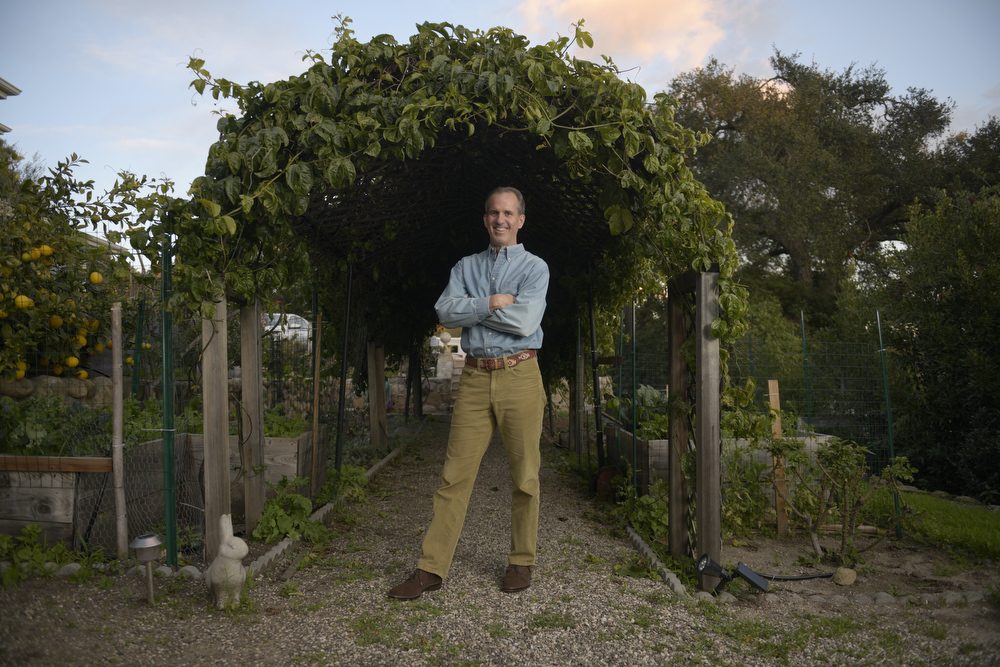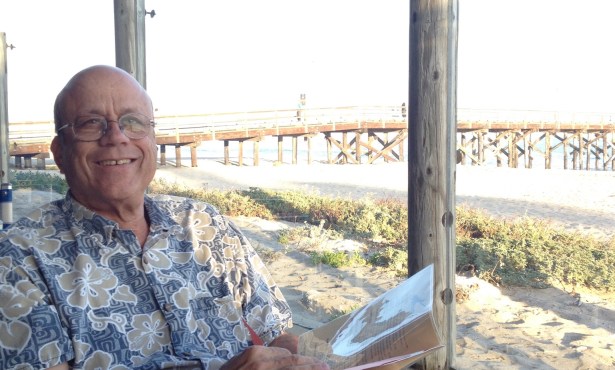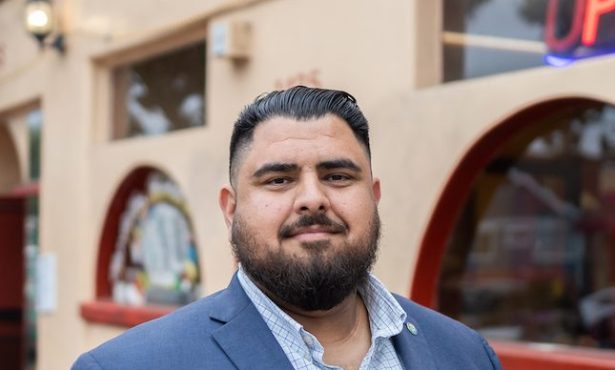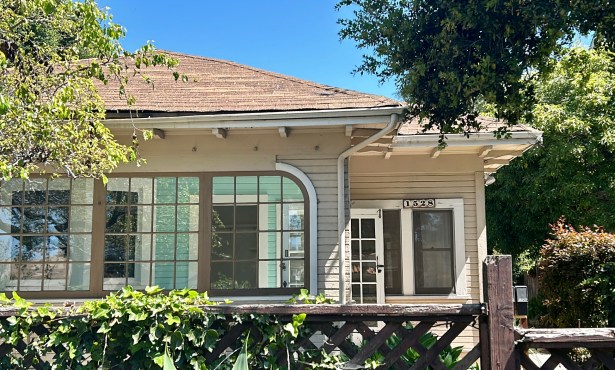The S.B. Questionnaire: William Peters
Talking End-of-Life Experiences with the Executive Director of the Shared Crossings Project

“We teach people how to create the conditions for a conscious, connected, and loving end-of-life experience that honors the desire and preferences of the person dying,” says William Peters, the executive director of the Shared Crossings Project. “Our programs raise awareness and educate about the profound and healing experiences that are available to the dying and their loved ones at the end of the human life.”
About two-thirds of people report that they want to die at home surrounded by loved ones, explains William, yet the opposite happens: two-thirds die in a medical center, and 20 percent of those die in the ICU. “That’s not the last memory you want to have of your loved one,” he says.
Besides the extensive training programs, William also leads the Shared Crossing Research Institute, a nonprofit collaboration with the Family Therapy Institute of Santa Barbara that studies shared death experiences. That can be a profound experience whereby a loved one, caregiver, or even bystander shares in a dying person’s initial transition from this world into the afterlife.
“We’re one of the only research institutes studying extraordinary end-of-life experiences,” he shares with me. “And our research is being recognized as groundbreaking.” He’ll present his findings in March to more than 4,000 medical practitioners at the American Academy of Hospice and Palliative Medicine Annual Conference.
On December 29, 1979, William suffered a severe spinal injury while skiing. “I was catapulted out of my body,” he retells. “I was in this tunnel, I saw this light. Classic near death experience. It felt so familiar and real.” He saw his life spinning out of him, and how his previous actions rippled through life. He vividly remembers pleading with this light that he had to go back and make something out of his life.
All of a sudden he describes feeling coming back to his body and begging not to be paralyzed. “I got back up and continued skiing down the mountain,” he says. But it changed his life. He never played sports again and felt as if he’d lost his identity as an athletic, healthy, free-spirited young man.
William attended the private Jesuit school Bellarmine College Preparatory and, after graduating in 1980, applied to only one school: UCSB. “I wanted to be by the beach,” he says. But UCSB wasn’t the experience he expected, plus his health started collapsing, so he transferred to UC-Berkeley to study political economics.
In the summer of 1984, he took a trip to Greece with friends and decided to go take a bus to Budapest. They ended up in Bosnia. When he woke up and looked at the window, there were women wearing burkas as far as he could see, their arms extended begging for money and food. “I made a commitment in that moment to find a way to live with people who were poor and disenfranchised,” he recalls.
He called his Jesuit theology teacher who told him about Jesuit International Volunteers. He applied and ended living in Belize. His first job out of college was teaching English from August 1985 to July 1986. He then traveled to Guatemala for six months to learn Spanish, and took a job in Peru working as a teacher and assisting in a children’s center. The children were Aymara natives from the Andes who had fled the violence and famine of their homeland and arrived as refugees in the southern town of Tacna. “I gave them meals and their dignity,” says William.
After coming back in 1989, he studied theology and philosophy at the Graduate Theological Union in Berkeley. He did social work for the St. Anthony’s Foundation, focused on addressing the exploding AIDS epidemic. Clients came for housing, food, counseling, and to learn how to deal with dying.
“I always knew AIDS was not contagious,” he says. “I got really close friends with the community that had contracted HIV. People dying surrounded me. I would bring food over and they invited me to be with them.” He heard many stories of shared death experiences between dying men and their loved ones. “It was moving to me,” he explains.
In 1993, he left St. Anthony’s Foundation and got a job at Teach for America. He taught Spanish in East Oakland, the worst part of town, for three years.
In 1996, he pursued a Master’s in education from the Harvard Graduate School of Education with an emphasis on group dynamics. “The key leaders in education at the federal level didn’t have a strategy on how to deal with the fundamental problem with our school district dealing with multiculturalism and the huge disparity in economics,” he explains.
He returned to Berkeley and suddenly realized that, due to that old spinal injury, he couldn’t walk and was in chronic pain. In 1998, began meditating at Spirit Rock in Marin County, and meditation became a foundation of his life, giving him refuge and relief from his pain.
While recovering from surgery in 1999, he volunteered in hospice unit at Laguna Honda Hospital. “I had a beautiful opportunity with people while they were dying,” he confides. “One afternoon, I was reading to a patient and I was having a shared out-of-body experience. He looked at me as if to say, ‘Check this out.’ It was a gift. This is where I’m going. This is what’s going to become of me. I was fascinated with this end of life experiences.” He became interested on the relationship between spirituality and human psychology.
In 2000, he attended the California Institute of Integral Studies and got a Master’s in counseling psychology. He started his career as a psychotherapist practicing in two offices in Berkeley and San Francisco. In 2009, he moved to Santa Barbara, wanting warmer weather and a smaller community. He joined the Family Therapy Institute, one of the largest providers of mental health services.
In October 2009, William attended a workshop at the Omega Institute titled “Soul Survival” that was led by Raymond Moody, the man who had introduced the Western world to the near death experience. Moody presented new research on the shared death experience, which compelled William to do his own research on the topic. “I can help people have them,” he explains. “I can enable loved ones to have these experiences.”
Moody was very supportive in encouraging William that this could help how people die in this country. “People are fighting the prolongation of their life with the assistance of our advanced medical system,” says William, “but these are medicalized deaths.”
William Peters answers the Proust Questionnaire.
What do you like most about your job?
I love engaging with people around one of life’s greatest challenges and mysteries: human death. Death often cuts through the veneer of life giving one access to what matters most. Being with people during a dying, death, or bereavement is paradoxically enlivening as these phases of life are extremely dynamic and transformative. Being in a death and dying situation is like being in another dimension somehow apart from the shared common reality of human life. I find this dimension to be packed with emotion, wisdom, and profound meaning. I feel humbled and honored to accompany people through this often scary yet sacred landscape.
What is your motto?
If you are going to do something, do it well.
What is your idea of perfect happiness?
Taking an invigorating swim with my daughter on a white sand beach in the tropics and then gazing out at the sea as the sun goes down. Seeing the emerald waters gently receive the falling sun, feeling the velvety breezes caress my body, hearing the waves greet the shore while palm trees rustle in the wind, and smelling the tropical fragrances of plumeria mixing with the moist salt air.
What is your greatest fear?
Getting trapped in intractable physical pain.
Who do you most admire?
Oscar Romero. I lived in Central America in the late 1980s. Oscar Romero, Archbishop of El Salvador, stood up for the rights and dignity of the poor against the oppressive ruling elites. He lived a very simple life which was contrary to the well-to-do life style of the Catholic hierarchy. Romero was assassinated in 1980 while leading a religious ceremony. His courage to speak out about the societal and economic injustices inspired movements throughout Latin America.
What is your current state of mind?
Pretty full, actually over full, with mostly fun and meaningful stuff.
What is the quality you most like in people?
Authenticity. I love sensing and feeling who people truly are.
What is the quality you most dislike in people?
Know-it-alls.
What do you most value in friends?
Integrity. I appreciate people living in accordance with their deepest values.
What is your most marked characteristic?
Technologically challenged.
Which words or phrases do you most overuse?
“I can’t believe this is happening!”
Which talent would you most like to have?
Proficiently playing the guitar or piano.
If you could change one thing about yourself, what would it be?
More patience!
What do you consider your greatest achievement?
Healing from a spinal injury that left me in chronic pain and limited mobility for 30 years.
Where would you most like to live?
In a small tropical coastal village in Latin America where I can swim in the sea every day, walk to the market place to pick out my fruits, vegetables, and fish for the day, and stroll through town chatting and laughing with friends and neighbors.
What is your most treasured possession?
My woven tote bags from Latin America. I love that a papaya can explode in them and I can simply spray them off and they are good to go.
Who makes you laugh the most?
My adolescent daughter talking with her friends.
Which historical figure do you most identify with?
Vernon Johns. He preceded Martin Luther King at Dexter Avenue Baptist Church and was highly controversial for his outspoken sermons on race relations which were ahead of his time. I feel like my view on the imperative to prepare (with loved ones) now for a conscious, connected, and loving end of life is ahead of its time. My perspective honors death as a natural part of life and, as such, is at odds with mainstream culture and current medical practices that fight death to prolong life without sufficient concern for quality of life and the emotional and financial toll on patients and their loved ones.
On what occasion do you lie?
When telling the truth harms a person unnecessarily.



